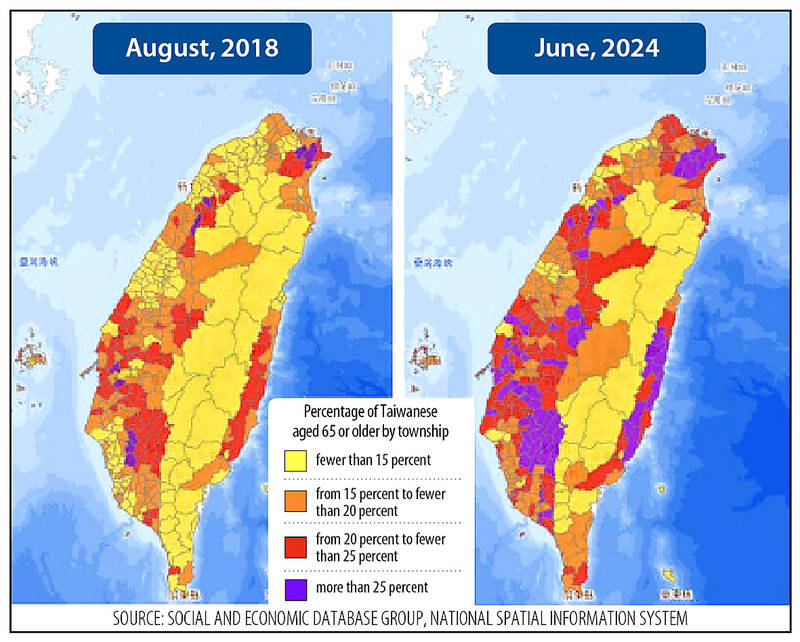Seven of the nation’s administrative regions, encompassing 57.2 percent of Taiwan’s townships and villages, became “super-aged societies” in June, the Ministry of the Interior said in its latest report.
A region is considered super-aged if 20 percent of the population is aged 65 or older.
The ministry report showed that Taiwan had 4,391,744 people aged 65 or older as of June, representing 18.76 percent of the total population and an increase of 1,024,425 people compared with August 2018.

In June, the nation’s elderly dependency ratio was 27.3 senior citizens per 100 working-aged people, an increase of 7.39 people over August 2018, it said.
That means there were about four working-aged Taiwanese for every person aged 65 or older who needed support, down from five last year, it said.
Chiayi County was the oldest region with 22.77 percent of its population aged 65 or older, followed by Taipei at 22.51 percent, Nantou County at 21.28 percent, Yunlin County at 20.85 percent, Keelung at 20.76 percent, Pingtung County at 20.54 percent and Hualien County at 20.2 percent, the report said.
Taipei and Keelung likely made the list due to the draw of better access to medical resources in the cities, the ministry said.
Hsinchu County, Hsinchu City, Lienchiang County and Taoyuan were the youngest regions with people older than 65 accounting for 14.25 percent, 15.06 percent, 15.4 percent and 15.48 percent of the local population respectively, it said.
The prevalence of young people in the jurisdictions — especially in Hsinchu county and city, home of the nation’s semiconductor industry — were likely linked to the high availability of jobs or other geographical factors, the ministry said.
Taiwan People’s Party Legislator Wu Chun-cheng (吳春城) last week introduced a bill urging the government to adjust its economic policy to account for the country’s aging population.
The bill, cosigned by legislators from across party lines, calls for replacing official language referring to “old age” and “senior citizens” with terms such as “the long-lived” and “of the strong generation.”
Taiwan is expected to lose 10 million people from its population in the next five decades to become the fastest-aging society in the world, Wu wrote in the bill’s statement of purpose, citing National Development Council data.
The nation must establish a basic law to address the aging crisis, as Japan did 30 years ago, he said, adding that Taiwan cannot afford inaction.
A Democratic Progressive Party lawmaker, speaking on the condition of anonymity, said that the bill’s proponents should provide a clearer definition for terms such as “the strong generation” before passing amendments.

MAKING WAVES: China’s maritime militia could become a nontraditional threat in war, clogging up shipping lanes to prevent US or Japanese intervention, a report said About 1,900 Chinese ships flying flags of convenience and fishing vessels that participated in China’s military exercises around Taiwan last month and in January have been listed for monitoring, Coast Guard Administration (CGA) Deputy Director-General Hsieh Ching-chin (謝慶欽) said yesterday. Following amendments to the Commercial Port Act (商港法) and the Law of Ships (船舶法) last month, the CGA can designate possible berthing areas or deny ports of call for vessels suspected of loitering around areas where undersea cables can be accessed, Oceans Affairs Council Minister Kuan Bi-ling (管碧玲) said. The list of suspected ships, originally 300, had risen to about 1,900 as

Japan’s strategic alliance with the US would collapse if Tokyo were to turn away from a conflict in Taiwan, Japanese Prime Minister Sanae Takaichi said yesterday, but distanced herself from previous comments that suggested a possible military response in such an event. Takaichi expressed her latest views on a nationally broadcast TV program late on Monday, where an opposition party leader criticized her for igniting tensions with China with the earlier remarks. Ties between Japan and China have sunk to the worst level in years after Takaichi said in November that a hypothetical Chinese attack on Taiwan could bring about a Japanese

MORE RESPONSIBILITY: Draftees would be expected to fight alongside professional soldiers, likely requiring the transformation of some training brigades into combat units The armed forces are to start incorporating new conscripts into combined arms brigades this year to enhance combat readiness, the Executive Yuan’s latest policy report said. The new policy would affect Taiwanese men entering the military for their compulsory service, which was extended to one year under reforms by then-president Tsai Ing-wen (蔡英文) in 2022. The conscripts would be trained to operate machine guns, uncrewed aerial vehicles, anti-tank guided missile launchers and Stinger air defense systems, the report said, adding that the basic training would be lengthened to eight weeks. After basic training, conscripts would be sorted into infantry battalions that would take

DEEP-STRIKE CAPABILITY: The scenario simulated a PLA drill that turned into an assault on Taiwan’s critical infrastructure, with the launchers providing fire support Taiwan yesterday conducted this year’s first military exercises at Longsiang Base in Taichung, demonstrating the newly acquired High Mobility Artillery Rocket System’s (HIMARS) ability to provide fire support and deep-strike capabilities. The scenario simulated an attack on Penghu County, with HIMARS trucks immediately rolling into designated launch areas and firing barrages at the Wangan (望安) and Cimei (七美) islands, simulating the provision of fire support against invading forces. The HIMARS are supposed to “fire and leave,” which would significantly increase personnel and equipment survivability, a military official said. The drill simulated an exercise launched by the Chinese People’s Liberation Army (PLA) Eastern